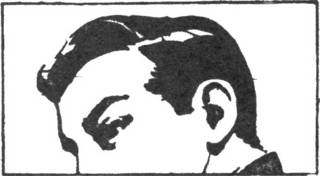One of the wonderful things about English as it is spoken in south India is the way it acquires an alien music. I once asked a stranger in the street for directions and was told to keep going
straiiiighta. It was the most remarkable pronunciation of the word I’d ever heard: the tongue curled back on the
t to stretch the diphthong as far as it would go and then moved forward swiftly to tap on the palate. I could tell that it would be a long journey, there would be a bend in the road at some point, but it would curve back eventually and I was to stop right there. Not too abruptly: that last
t was softened with a half-vowel, after all.
There’s something about closing a word with a hard consonant that irks the Tamil speaker, so the inflections of his own language are applied to English loanwords: in Chennai, it's quite
correctu to say
leftu,
rightu, and
straightu. This linguistic tic is so common, it's become a standard feature in spoofs of South Indian English. So you have advertising slogans that claim
'Eastu, Westu, Northu, Southu, Vasthu bestu', and
joke translations from the Tamil that read like this:
Moonu broughtu
tied it on the cotu
cloudu broughtu
put it on the bedu
(Sathya Sankaran, Corrupted Mind, June 30, 2005)
Usage of this kind is highly informal, of course, so there's no standard way of rendering the half-vowel. One person may write
tightu, another
tighta.
Tight-aa? on the other hand, is how you might ask a friend if he's had too much to drink:
the aa tag is a separate device altogether that conveys emphasis or interrogation. (A Tamil De Niro, if such a thing existed, would stand in front of the mirror and say 'You're talking to who? I-aa?', to which the reflection would doubtless reply 'Amaa! You-e!'). I'm sure a native speaker could point out many more variations and uses of the vowel tag:
this blog goes so far as to suggest, tongue in cheek, that you can get by in Chennai without any Tamil, 'all you need to survive is to put an "A" after an English word'.
example: Yogu sits in Chennai auto.
Yogu: Po!
Rajnikant Autowala: Aiyyo!!! Po whereA!?!?!
Yogu: Amma!!! Po Lefta...then Righta!!!
Rajnikant Autowala: Aha...OK ma...understanda.
Destination Reacheda.
Rajnikant Autowala: Pathu ruppes saar...
Yogu: Pathu rupees ma!?!?! Tambee!!! Vermina!!! Mongrela!!! Appa Kundee!!! Chenee rida BIG fareA!?!?! shiva shiva...
Rajnikant Autowala: Sunday ma! Shiva temble yextra farea!!!
(Yogustus Caesar, GetAFix, 17 Oct, 2004)
Chico Marx in a
mundu? Well, not quite. Unlike the Marx Brothers' mock-Italian, this brand of Instant Tamlish is used even when no parody is intended. You'll find it in internet forums frequented by Tamilians, where people tend to write as they speak. Here, the vowel tags merely reproduce the inflections of the spoken language. Some random examples from the
TFM and
Sysindia forums:
Romba correctu!
Original-a illa duplicate-aa?
Iyya naga sonna sonathu than correctu mathavanga yellam corruptu.
Anyway, ippa noveloda plot tighta irukku.
It sounds like a combo of maalkouns + chandrakouns, correctaa ?
Telugu films are stepsu, dancu & fightu. That's all.
Yes, that's about it. I'm going to watch TV now, see if I can catch
Righta? Wronga? on the Tamil channel.
